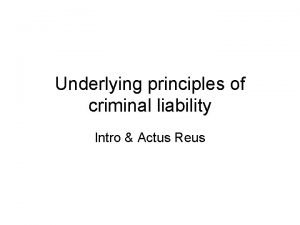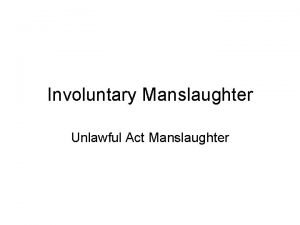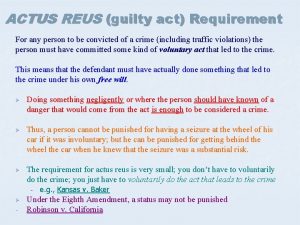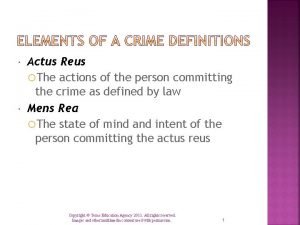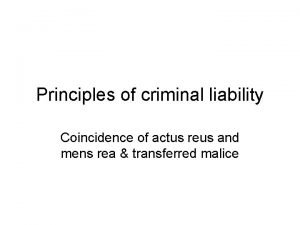Actus Reus What is Actus Reus The act









- Slides: 9

Actus Reus What is Actus Reus? - The act of the defendant

Some examples of crimes you will look at later in the unit – which part is AR and which part is MR? • Assault - D intentionally or recklessly causes the victim to apprehend immediate and unlawful violence • Battery – D intentionally or recklessly applies unlawful physical force to another • ABH – D intentionally or recklessly commits an assault which occasions actual bodily harm • S. 20 GBH – D Unlawfully and maliciously wounds or inflicts any grievous bodily harm upon any other person, either with or without any weapon or instrument with intent or recklessness to inflict some harm • S. 18 GBH – D unlawfully and maliciously by any means whatsoever wounds or causes any grievous bodily harm to any person with intent to do some grievous bodily harm to any person

Omissions • Omission means failure to act • Should someone be guilty for what they do not do? • Usually a person is not liable for omissions (as there would be no AR – guilty act) • There are some exceptions where there is a duty to act

Omissions – Duty to Act – Contractual Duty • Pittwood – D employed as a gatekeeper at a railway crossing. D went for lunch leaving the gate open – meant that road traffic could cross the railway line. A cart crossing the line was hit by the train and one man in the cart was killed. D convicted on manslaughter based on failure (omission) to carry out his duty to close the gate, which was part of his contract of employment – there will be a duty to act when it is part on one’s contract which can mean an omission to act could form the AR of an offence

Omissions – Duty to Act – Where person’s public position requires him to act • Dytham – uniformed police officer saw a man who ended up being kicked to death and took no steps to stop the attack and drove away when it was over – convicted of misconduct in a public office as he had omitted to act to protect the victim

Omissions – Duty to Act – When Act of Parliament Requires a Person to Act • E. g. requirement to wear a seatbelt while driving, neglecting to look after a child

Omissions – Duty to Act – Where a Person Fails to Minimise the Harmful Consequences of His Act • Miller – D had been squatting in a house and fell asleep on a mattress while smoking a cigarette. He was awoken by the flames, but instead of putting the fire out, he simply got up and went into another room, where he found another mattress and went back to sleep. House was damaged in the fire. D convicted of criminal damage as once he awoke and realised what had happened, he had a duty to minimise the harmful effects of the fire, which he had omitted to do

Omissions – Duty to Act – Where a Person Voluntarily Takes On A Duty • Stone and Dobinson – Ds lived together but were of low intelligence and had many personal difficulties. S’s sister, who was anorexic, came to live with them, and although she was ill she refused to leave her room to seek medical attention. Ds made some effort to care for the sick woman but did not call the medical services. Eventually she died. Ds convicted of manslaughter as they had taken on a duty of care by allowing the sister to live in their home and then omitted to make other arrangements for her while knowing that she relied on them

Act must be Voluntary • AR must be voluntary if D is to be guilty • Hill v Baxter – driver of a car suffered a heart attack so not liable for his actions as they were not voluntary. Court gave examples of situations where a driver of a car would not be driving voluntarily – e. g. being stung by a swarm of bees, being hit on a head with a stone – such actions do not form the AR of a crime
